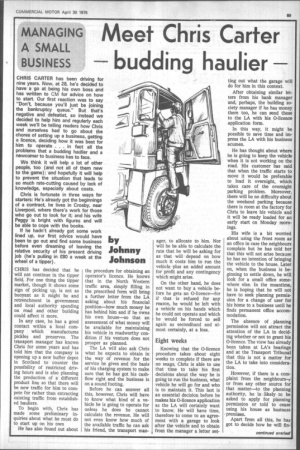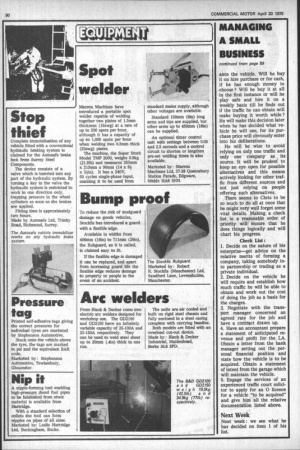MANAGING Meet Chris Carter BUSINESS budding haulier
Page 91

Page 92

If you've noticed an error in this article please click here to report it so we can fix it.
by Johnny Johnson
CHRIS CARTER has been driving for nine years. Now, at 28, he's decided to have a go at being his own boss and has written to CM for advice on how to start. Our first reaction was to say "Don't, because you'll just be joining the bankruptcy queue." But that's negative and defeatist, so instead we decided to help him and regularly each week we'll be telling readers how Chris and ourselves had to go about the chores of setting up a business, getting a licence, deciding how it was best for him to operate . . . in fact all the problems that a budding hatilier and a newcomer to business has to face.
We think it will help a lot of other people, too (and not all of them new to the game); and hopefully it will help to prevent the situation that leads to so much rate-cutting caused by lack of knowledge, especially about costs.
Chris is fortunate in three ways for starters: He's already got the beginnings of a contract, he lives in Crosby, near Liverpool, where there's work for those who go out to look for it; and his wife Peggy is bright with figures and will be able to cope with the books.
If he hadn't already got some work lined up, our first advice would have been to go out and find some business before even dreaming of leaving the relative security of his present driving job (he's pulling in MO a week at the wheel of a tipper).
CHRIS has decided that he will not continue in the tipper field. For one thing the tipper market, though it shows some sign of picking up, is not as buoyant as it might be and retrenchment in government and local authority spending on road and other building could affect it more.
In any case, he has a good contact within a local company which manufactures pickles and preserves. The transport manager has known Chris for some years and has told him that the company is opening up a new buffer depot in Scotland to counter the possibility of restricted driving hours and is also planning the production of a different product line so that there will be new traffic for him to compete for rather than extracting existing traffic from established hauliers.
To begin with, Chris has made some preliminary inquiries about what he must do to start up on his own He has also found out about the procedure for obtaining an operator's licence. He knows that in the North Western traffic area, simply filling in the prescribed form will bring a further letter from the LA asking about his financial position—how much money he has behind him and if he owns his own house—so that an assessment of what money will be available for maintaining his vehicle in roadworthy condition if his venture does not prosper as planned.
The LA will also ask Chris what he expects to obtain in the way of revenue for the service he gives and the basis of his charging system to make sure that he has got his cashflow right and the business is on a sound footing.
Before he can answer all this, however, Chris will have to know what kind of a vehicle he is going to operate for unless he does he cannot calculate the revenue. He will not even know how much of the available traffic he can ask his friend, the transport man ager, to allocate to him. Nor will he be able to calculate the rate that he will be asking for as that will depend on how much it costs him to run the vehicle plus an added amount for profit and any contingency which might arise.
On the other hand, he does not want to buy a vehicle before he gets an 0-licence—for if that is refused for any reason, he would be left with a vehicle on his hands which he could not operate and which he would be forced to sell again as secondhand and almost certainly, at a loss.
Eight weeks
Knowing that the 0-licence procedure takes about eight weeks to complete if there are no snags, Chris is able to use that time to take his first decisions about the way he is going to run the business, what vehicle he will go for and who is to maintain it. This last is an essential decision before he makes his 0-licence application as the LA will certainly want to know. He will have time, therefore to come to an agreement with a garage to look after the vehicle and to obtain from the manager a letter set ting out what the garage will do for him in this context.
After obtaining similar letters from his bank manager and, perhaps, the building society manager if he has money there too, he can send these to the LA with his 0-licence application form.
In this way, it might be possible to save time and impress the LA with his business acumen.
He has thought about where he is going to keep the vehicle when it is not working on the road. His customer has said that when the traffic starts to move it would be preferable to load it overnight, which takes care of the overnight parking problem. Moreover, there will be no difficulty about the weekend parking because there is room at the factory for Chris to leave his vehicle and it will be ready loaded for an early start on Monday mornings.
His wife is a bit worried about using the front room as an office in case the neighbours complain but he has told her that this will not arise because he has no intention of bringing the vehicle to the house. Later on, when the business is be ginning to settle down, he will look for a small office somewhere else. In the meantime, he is hoping that he will not have to seek planning permission for a change of user for his home to a business until he finds permanent office accommodation.
The absence of planning permission will not attract the attention of the LA in decid ing whether or not to grant his 0-licence. The view has already been taken at LA's hearings and at the Transport Tribunal that this is not a matter for the LA to take into consideration.
However, if there is a complaint from the neighbours or from any other source for that matter—to the planning authority, he is likely to be asked to apply for planning permission or told to cease using his house as business • premises_ Apart from all this, he has got to decide how he will fin ance the vehicle. Will he buy it on hire purchase or for cash, if he has enough money to choose ? Will he buy it at all in the first instance or will he play safe and hire it on a weekly basis till he finds out if the traffic he can obtain will make buying it worth while ? He will make this decision later when he has decided what vehicle he will use, for its purchase price will obviously enter into his deliberations.
He will be wise to avoid relying on only one traffic and only one company as its source. It will be prudent to keep an eye open for possible alternatives and this means actively looking for other traffic from different sources and not just relying on people offering such alternatives.
There seems to Chris to be so much to do all at once that he might very well forget some vital details. Making a check list in a reasonable order of priority will ensure that he does things logically and will chart his progress.
Check List : 1. Decide on the nature of his enterprise—get advice on the relative merits of forming a company, taking somebody into partnership or trading as a private individual.
2. Decide on the vehicle he will require and establish how much traffic he will be able to obtain and work out the cost of doing the job as a basis for the charges.
3. Negotiate with the transport manager concerned an agreed rate for the job and have a contract drawn up.
4. Have an accountant prepare a statement of anticipated revenue and profit for the LA. Obtain a letter from the bank manager setting out the personal financial position and state how the vehicle is to be acquired. Obtain a statement of intent from the garage which will maintain the vehicle.
5. Engage the services of an experienced traffic court solicitor to apply for an 0 licence for a vehicle "to be acquired" and give him all the relative documentation listed above.
Next Week Next week : we see what he has decided on item 1 of his list.
















































































































































